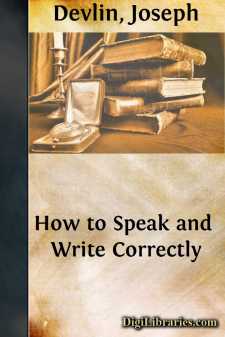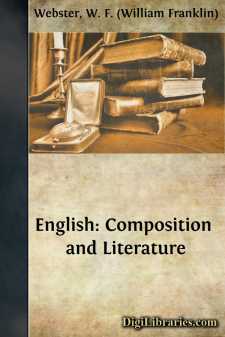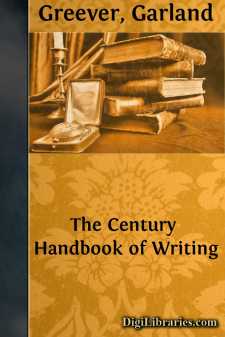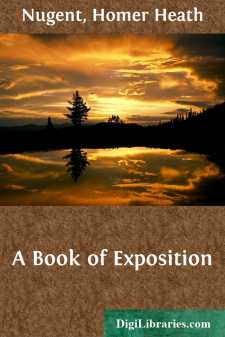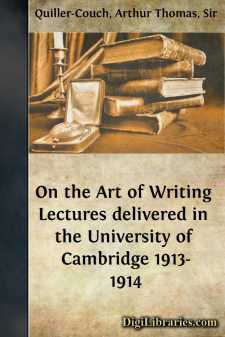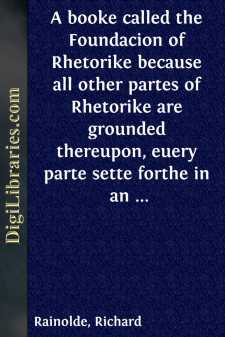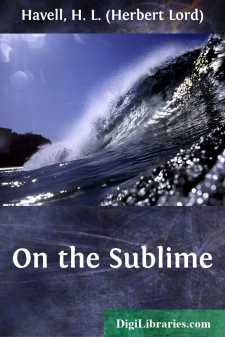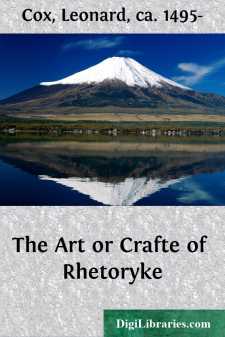Language Arts & Disciplines
- Alphabet 2
- Authorship 5
- Composition & Creative Writing 2
- Etymology 4
- General 30
- Grammar 18
- Journalism 3
- Phonetics & Phonics 1
- Public Speaking 1
- Publishing 1
- Readers 2
- Reading Skills 1
- Rhetoric
- Semantics 1
- Spelling 2
- Study & Teaching 3
- Translating & Interpreting 2
- Vocabulary 5
Rhetoric Books
Sort by:
by:
Joseph Devlin
CHAPTER I REQUIREMENTS OF SPEECH Vocabulary—Parts of Speech—Requisites It is very easy to learn how to speak and write correctly, as for all purposes of ordinary conversation and communication, only about 2,000 different words are required. The mastery of just twenty hundred words, the knowing where to place them, will make us not masters of the English language, but masters of correct speaking and...
more...
PREFACE In July, 1898, I presented at the National Educational Association, convened in Washington, a Course of Study in English. At Los Angeles, in 1899, the Association indorsed the principles of this course, and made it the basis of the Course in English for High Schools. At the request of friends, I have prepared this short text-book, outlining the method of carrying forward the course, and...
more...
by:
Garland Greever
Fragments Wrongly Used as Sentences 1. Do not write a subordinate part of a sentence as if it were a complete sentence. Wrong: He stopped short. Hearing some one approach. Right: He stopped short, hearing some one approach. [Or] Hearing some one approach, he stopped short. Wrong: The winters are cold. Although the summers are pleasant. Right: Although the summers are pleasant, the winters are cold....
more...
INTRODUCTION The articles here presented are modern and unhackneyed. Selected primarily as models for teaching the methods of exposition employed in the explanation of mechanisms, processes, and ideas, they are nevertheless sufficiently representative of certain tendencies in science to be of intrinsic value. Indeed, each author is a recognized authority. Another feature is worthy of mention. Although...
more...
LECTURE I. INAUGURAL Wednesday, January 29, 1913 In all the long quarrel set between philosophy and poetry I know of nothing finer, as of nothing more pathetically hopeless, than Plato's return upon himself in his last dialogue 'The Laws.' There are who find that dialogue (left unrevised) insufferably dull, as no doubt it is without form and garrulous. But I think they will read it with...
more...
by:
Richard Rainolde
To the Reader. PHTHONIVS a famous man, wrotein Greke of soche declamacions, to en-structe the studentes thereof, with all fa-cilitée to grounde in them, a moste plenti-ous and riche vein of eloquence. No manis able to inuente a more profitable waieand order, to instructe any one in the ex-quisite and absolute perfeccion, of wisedome and eloquence,then Aphthonius Quintilianus and Hermogenes. Tullie...
more...
INTRODUCTION TREATISE ON THE SUBLIME Boileau, in his introduction to his version of the ancient Treatise on the Sublime, says that he is making no valueless present to his age. Not valueless, to a generation which talks much about style and method in literature, should be this new rendering of the noble fragment, long attributed to Longinus, the Greek tutor and political adviser of Zenobia. There is,...
more...
by:
Leonard Cox
¶ To the reuerende father in god& his singuler good lorde / the lorde HughFaryngton Abbot of Redynge / his poreclient and perpetuall seruaunt LeonardeCockes desyreth longe & prosperouse lyfewith encreace of honour. Onsiderynge my spe[-]ciall good lorde how great[-]ly and how many ways Iam bounden to your lord-shyp / and among all otherthat in so great a nombreof counynge men whiche are now...
more...


